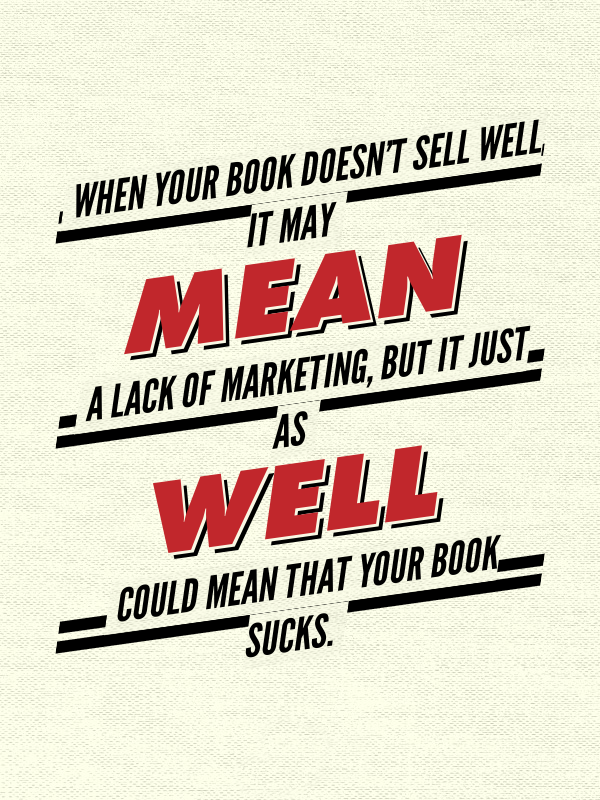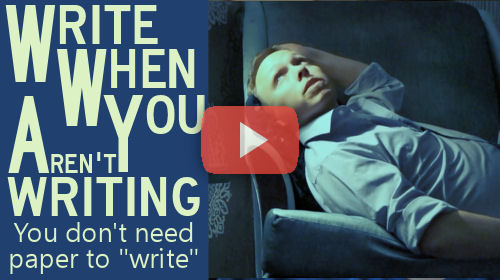I used to write a lot of fiction. For about 10 years of my life, that's all I did creatively. Now, I mostly write non-fiction and video scripts. In this video, I pick up my books for the first time in years and try to recall what they are about. It's weird to think a writer could forget something seemingly so big and important as one of their own books. Maybe it is weird, and I'm just bad a memory. Link where you can buy the books: https://calebjross.com/works/booklength/
Tag Archives writing
I’ve been a professional writer for zero years, so please pay attention when I tell you this: you probably need to stop doing the following three things. 1. Stop listing your job as author or writer in social profiles unless you truly do make a living as an author or writer I understand the desire to be perceived as a capital A Author. I also may even understand the fake-it-until-you-become it mentality. There’s a hope of perpetual perceptual motion when you start calling yourself a writer; eventually people around you see you as a writer which may even lead to legitimate writing gigs with legitimate money (not contributor copies). But what you may be doing--without even realizing it--is an injustice to young writers who themselves want to be professionals one day. If new writers see you claiming to be a professional, they may interpret your likely paltry output (a novel…
Andrew, known as HeavyShelves in BookTube land, was kind enough to invite me to a Google Hangout a few nights ago where he treated me like a rockstar for almost 3 hours. That's a long time, especially when you consider the time frame was 12am - 3am his time (he's in the UK). I definitely encourage you to take a watch. Or, just listen, as you would a podcast (visually, it's pretty much just webcam style cuts between his face and mine...except for one truly amazing appearance by Nicholas Cage...see image below). Andrew asked some great questions, and we had some great discussions. List for these gems: My publishing history (and the importance of knowing people, starting here) Writers need to know their productivity limitations (more about why I can't be allowed to write 8 hours/day, starting here) The importance of caring about what you write (the real "write what…
I only recently heard about Vyou.com. I like the concept, so I'm trying it out. For those uninitiated, Vyou.com is like a cross between video chat and YouTube given the veneer of an amateur interview portal. Basically, ask any member anything, and they respond via video. I know, you could do this on YouTube, so why go to Vyou.com to do it? Well, the Vyou.com interface is built specifically to handle the asking and responding of quick questions via video. I'm not celebrity enough for anyone to care about my personal opinions on things (though, I'm not promising not to spew a visual diary every once-in-a-while), so what kinds of questions should you ask me? Anything, really. Do you want to know about publishing? Ask. About writing? Ask. About cartoons? Ask. Do you have questions regarding any of my many blog posts on this site (537 to date)? Ask. Who knows how long…
No book review from me this time. Judging by my recent history, it’d be a wise guess to say I do little more than read and review books. But such a guess would also be wrong. I also lounge in hotel chairs and talk about the problem of not writing as I—get this—don’t write. Are you a writer who sometimes has trouble…performing? Then this pill…uh, video… is for you. Don’t kick yourself for letting your partner down. Lack of writing happens to everyone. Really. It does. Even me. I hope my courage can be your courage. Also, did you know Jim Lehrer writes fiction? Yep. A lot of it.
The amazing Laurance Kitts interviews me for his Slit Your Wrists Magazine website, a site that frequent visitors may recognize; my story "Sebaceous" appeared there back in April. Laurance knows how to ask questions without bowing to a person's ego, so you can read this Q&A without anticipating a pretentious me basking in the warmth of praise. I mean, sure, Laurance does feed me some softballs, but...those are easier to chew.
 Disclaimer: I am far from a career author. I’ve made enough money to buy a few fifths of whisky and some diapers for my baby, so needless to say I’ve got a long way to go. The following plan reflects this outsider (re: possibly ignorant) perspective.
The idealized author spends his time alone, churning out typewritten manuscripts to meet constant deadlines. He drinks. Probably smokes. He’s respected. He vacations in tropical seclusion, but still, even with the changed view, he writes. He has no day job. He is an author. Writing puts his kids through college.
There is a reason this image contains a typewriter. Much like the machine itself, the idealized author is all but extinct. I think a lot of writers would like to go back to this model. Is it possible to not just retain the author career, but to make it thrive?
Given the following set of assumptions, I believe it would be possible to bring back the author career:
Disclaimer: I am far from a career author. I’ve made enough money to buy a few fifths of whisky and some diapers for my baby, so needless to say I’ve got a long way to go. The following plan reflects this outsider (re: possibly ignorant) perspective.
The idealized author spends his time alone, churning out typewritten manuscripts to meet constant deadlines. He drinks. Probably smokes. He’s respected. He vacations in tropical seclusion, but still, even with the changed view, he writes. He has no day job. He is an author. Writing puts his kids through college.
There is a reason this image contains a typewriter. Much like the machine itself, the idealized author is all but extinct. I think a lot of writers would like to go back to this model. Is it possible to not just retain the author career, but to make it thrive?
Given the following set of assumptions, I believe it would be possible to bring back the author career:
- Content will continue to outweigh consumption
- The marketplace is spoilt by free content, and much of that content will continue to be free
- eBooks/eReaders will be a primary content medium within the next decade
- The cost to produce and distribute market-quality products will continue to fall
- Consolidate the agent and publisher roles. Basically, this combined entity should act as a time and beaurocracy manager for authors. Today, authors have the ability to publish and distribute their own content without the help of agents and publishers. If this Pub/Agent composite can give authors time to write, then they will ultimately be given the sort of consistent product that the marketplace loves. Marketing thrives on trends. Giving authors time is the way to nurture trends.
- Increase author royalties. As media becomes electronic, the savings on overhead and distribution must be passed on. Court your talent, publishers. I’ve read the arguments against electronic media being cost-savers for publishers, and I just don’t believe them.
- Embrace the eBook paradigm shift. As a reader, I haven’t yet fallen in love with eBooks. As a writer, I am very excited by the possibilities. Instead of fighting to keep print alive, fight to make eBooks thrive. eBooks have the potential to increase the pool of readers, much as the iPod did for music enthusiasts.
- Brand yourselves as independent records labels do. Make fans out of your press, not just out of your authors. I won’t go into much depth here about this, but we do have an episode forthcoming at the Welcome to The Velvet podcast on this topic.
- Provide consistent and brandable content. As Dan Holloway says in the comments at Jane Smith’s How Publishing Really Works blog, “If you are writing for the art, by all means try your hand at getting an agent, but don’t be upset if you don’t get one – and if the feedback is that you should be more commercial in order to get one, then make the decision – do you want to write for the pay packet, or do you REALLY want to do it for the art? And if it’s the latter, don’t expect to be picked up, or blame the publishers when you aren’t.”
- Prove that you can provide that content. As Jane Smith says in a response to the above comment, “I think that a big reason that most writers make such a paltry amount is that there are lots of people out there who call themselves writers but who only really dabble with writing: they sell an article every now and then, take several years to write just one book; sure, they’re writers–but not full-time, serious writers.”. A career author must write as though it is a career.





